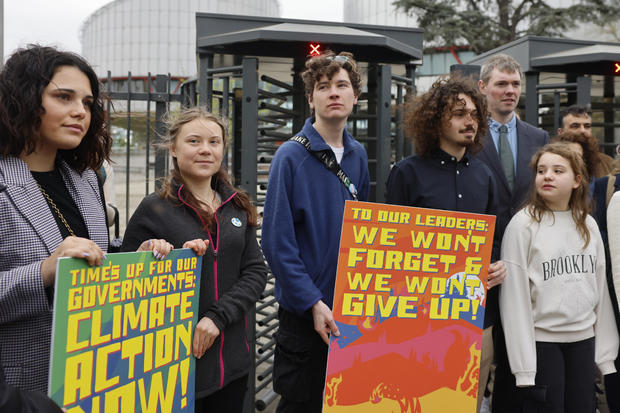European nations must protect citizens from climate change impacts, EU human rights court rules
Strasbourg, France — Europe's highest human rights court ruled Tuesday that its member nations have an obligation to protect their citizens from the ill effects of climate change, but it still threw out a high-profile case brought by six Portuguese youngsters aimed at forcing countries to reduce greenhouse gas emissions.
The European Court of Human Rights sided with more than 2,000 Swiss members of the Senior Women for Climate Protection group, who sought similar measures to the Portuguese youths, in a mixed session of judgements handed down on Tuesday. In a third, a French mayor similarly seeking stronger government efforts to combat climate change was also defeated.
Lawyers for all three had hoped the Strasbourg court would find that national governments have a legal duty to make sure global warming is held to 1.5 degrees Celsius (2.7 degrees Fahrenheit) above pre-industrial levels, in line with the goals of the Paris climate agreement that those governments signed onto.
- Parts of U.S. "uninsurable" due to climate change risks, study finds
"I really hoped that we would win against all the countries, so obviously I'm disappointed that this didn't happen," said 19-year-old Sofia Oliveira, one of the Portuguese plaintiffs. "But the most important thing is that the Court has said in the Swiss women's case that governments must cut their emissions more to protect human rights. So, their win is a win for us, too, and a win for everyone!"

Swedish climate activist Greta Thunberg agreed with that positive assessment, saying outside the European court on Tuesday that the ruling was "only the beginning of climate litigation" and noting that, "all over the world more and more people are taking their government to court, holding them responsible for their actions."
In a reference to its fundamental Convention of Human Rights, "the court found that Art. 8 of the Convention encompasses a right for individuals to effective protection by the state authorities from the serious adverse effects of climate change on their lives, health, well-being and quality of life."
Judgments from the European Court of Human Rights set a legal precedent against which future lawsuits would be judged in the Council of Europe's 46 member states.
Although activists have had successes with lawsuits in domestic proceedings, this was the first time an international court ruled on climate change.
"This is a turning point," said Corina Heri, an expert in climate change litigation at the University of Zurich. She said Tuesday's decision confirmed for the first time that countries have an obligation to protect people from the effects of climate change and will open the door to more legal challenges.
Activists have increasingly turned to courts to force efforts by governments to tackle climate change. In August 2023, a Montana court ruled — in a first-of-its-kind trial in the U.S. — in favor of a group of young activists who had accused state agencies of violating their rights to a clean environment.
Ahead of the ruling on Tuesday, a large crowd gathered in front of the court building in Strasbourg to cheer and wave flags, including Thunberg, who was coming off of multiple arrests during a demonstration in The Hague over the weekend.
The decisions have "the potential to be a watershed moment in the global fight for a livable future. A victory for any of the three cases would be one of the most significant developments on climate change since the signing of the Paris Agreement" said Gerry Liston, a lawyer with the Global Legal Action Network, which is supporting the Portuguese students.
The European Union, which doesn't include Switzerland, currently has a target to be climate-neutral by 2050. Many governments have said that meeting a 2030 goal would be economically unattainable.
The groups were confident that the 17 judges would rule in their favor, but the mixed decision could undermine a previous ruling in the Netherlands. In 2019, the Dutch Supreme Court ordered the government to cut emissions by at least 25% by the end of 2020 from benchmark 1990 levels.
The Urgenda decision, referring to the climate group that brought the case, relied on the European Convention of Human Rights. It could be overturned if Tuesday's decision concludes there is no legal obligation for countries to combat climate change.
"A court ruling is binding on all countries," said Dennis van Berkel, who represented Urgenda in the Netherlands.
Together with five more young people, 16-year-old André dos Santos Oliveira took Portugal and 32 other nations to court, arguing the failure to stop emissions violated their fundamental rights. Their case was thrown out.
"The extreme heat waves, the rainfalls, followed by heat waves, it is just choking us with greenhouse effects. And what worries me is the frequency in which they started happening more and more. That's what really scared me. And, I thought to myself, well, what can I do?" she said.
But judges ruled in favor of a group of Swiss retirees also demanding their government do more. Senior Women for Climate Protection, whose average age is 74, say older women's rights are especially infringed on because they are most affected by the extreme heat that will become more frequent due to global warming.
Earth shattered global annual heat records in 2023, flirted with the world's agreed-upon warming threshold, and showed more signs of a feverish planet, Copernicus, a European climate agency, said in January.
In all three cases, lawyers argued that the political and civil protections guaranteed by the European Convention on Human Rights are meaningless if the planet is uninhabitable.
Switzerland is not alone in being affected by global warming, said Alain Chablais, representative of the country at last year's hearings. "This problem cannot be solved by Switzerland alone."
Acknowledging the urgency of the climate crisis, the court fast-tracked all three cases, including a rare move allowing the Portuguese case to bypass domestic legal proceedings.
- In:
- Paris Climate Accord
- Lawsuit
- Climate Change
- Global warming
- European Union
- Greta Thunberg
Disclaimer: The copyright of this article belongs to the original author. Reposting this article is solely for the purpose of information dissemination and does not constitute any investment advice. If there is any infringement, please contact us immediately. We will make corrections or deletions as necessary. Thank you.
Title:European nations must protect citizens from climate change impacts, EU human rights court rules
Url:https://www.investsfocus.com









